This article was co-authored by Supatra Tovar, PsyD, RD. Dr. Supatra Tovar is a Licensed Clinical Psychologist (PSY #31949), Registered Dietitian, Fitness Expert, and the Owner of Dr. Supatra Tovar and Associates. Dr. Tovar has worked in the fields of health education, clinical dietetics, and psychology. With over 25 years of holistic wellness experience, she practices Holistic Health Psychotherapy. She combines her psychology, diet, and fitness knowledge to help those struggling with depression, weight gain, eating disorders, life transitions, and relationships. Dr. Tovar holds a BA in Environmental Biology from The University of Colorado Boulder, an MS in Nutrition Science from California State University, Los Angeles, and a PsyD in Clinical Health Psychology from Alliant International University, Los Angeles.
There are 15 references cited in this article, which can be found at the bottom of the page.
wikiHow marks an article as reader-approved once it receives enough positive feedback. This article received 25 testimonials and 91% of readers who voted found it helpful, earning it our reader-approved status.
This article has been viewed 693,530 times.
Is there is something about to happen the next day that's making you too jumpy and excited to be able to sleep? Excitement can make you stay up all night, or make you feel like you just can't remain still. Relaxing your mind and body can help you get the rest you need, even if you're anticipating (or dreading) the next day.
Steps
Treating It Like Every Other Night
-
1Try going to bed at your normal bedtime. Going to bed early may cause you more anxiety and restlessness. Studies suggest that going to bed at the same time every night can help your body stay on schedule, which can go a long way toward helping you remain well-rested and healthy.[1]
-
2Keep your room cool. If your body is too hot or too cold, you might be adding physical stress to an already restless night. Sleep studies have found that a room temperature between 60-67 degrees Fahrenheit (or 15.5-19.4 degrees Celsius) is the ideal range for restful REM sleep.[2]
- Check that windows are open or closed as needed, to allow for appropriate cooling and heating. Do this before getting into bed.
- Try using a fan. It will provide your room with white noise while also keeping you comfortably cool.
Advertisement -
3Make arrangements for the morning well before bed. If you've already got a lot on your mind, dwelling on everything you'll need to do in the morning will only make it worse. Take preventative action and finish any packing, cleaning, or laundry you'll need for the morning well before your head hits the pillow.
-
4Avoid screen glare. Light reduces your body's production of melatonin, which helps you fall asleep. Avoid watching television and using computers, tablets, or smart phones before bed.
- You can also put your devices in night mode to block sleep-disrupting blue light that is present in many electronic devices.
Calming Your Mind and Body
-
1Listen to your body. If you're lying awake and too excited or anxious to fall asleep, that's probably not going to change on its own. Try getting up and doing something to distract your mind. Your body will let you know when it's tired, and when you return to bed you may find it easier to fall asleep.[3]
-
2Listen to music. Music can have a powerful effect on the brain, and if you're feeling overly excited you may find it helpful to listen to soothing music.[4]
- If you have a particular album that always calms you down, try listening to it in the dark.
- Listen to a recording of natural sounds, like rainfall or ocean waves, which can create the illusion of a calm, natural environment.
- Try listening to a sad song. Research suggests that sad music can actually leave listeners feeling soothed and even uplifted, which may help curb the restlessness that's keeping you awake.[5]
-
3Try working out. While some people find that the adrenaline boost from vigorous exercise wakes them up, most people sleep better after working out. Exercise helps release stress and can make you feel calmer, which can add up to a restful night of sleep.[6]
-
4Use meditation to calm your mind and body.[7] There are many different types and styles of meditation, but choosing the right one for you can be a rewarding and calming experience. If you're too wound up to fall asleep, try engaging in yoga or meditation to stop your mind from racing and help relax your body.[8]
-
5Try gradual relaxation techniques. Focus all of your attention on your body, beginning with your toes and working your way up to your head. This can help you distract your mind from thinking about whatever is keeping you awake.[11]
-
6Write down what's on your mind. If you have things to do or a brilliant idea on your mind to tackle later, make a note so you won't focus on it while trying to sleep.[12] It's no help to you trying to remember all those undone tasks, and dwelling on them at night might prevent you from getting a good night's sleep.[13]
-
7Take a bath. A shower will also help you relax, but soaking in a bathtub relaxes the muscles better, and researchers have found that lying in a bath can have positive psychological results.[14] Whether bathing or showering, the hot water can help calm your mind and relax your body.
Trying a Natural Sleep Aid
-
1Drink some warm liquids. Whether you reach for a glass of warmed milk, a herbal tea (or other non-caffeinated tea), or a weak hot chocolate (remember that it contains caffeine though), holding and sipping a warm beverage can make you feel happier, more receptive, and relaxed.[15]
- Avoid caffeinated drinks for several hours before bed. Stick to herbal or naturally decaffeinated beverages.
- If you're prone to getting up during the night to visit the bathroom, you might wish to skip this step
-
2Try aromatherapy. Smelling scented oils and herbal concentrates associated with relaxation, like lavender, may help calm the body and promote a more restful night's sleep.[16]
-
3Consider an herbal supplement. Though they aren't as thoroughly researched as prescription medications, herbal supplements may be helpful as a sleep aid, when used correctly.
- Valerian is a common sleep aid, with documented use going back hundreds of years.[17]
- Melatonin is a hormone that the human body produces naturally. Taking a synthetic melatonin supplement may help reduce the time it takes to fall asleep and can improve your overall quality of sleep at night. But remember, light interferes with your body's melatonin production, so it's best to avoid screen glare before bed, even if you're taking melatonin.
- Always consult with your doctor or primary care giver before taking any sleep aids or supplements.
Expert Q&A
-
QuestionHow can I calm my excitement?
 Supatra Tovar, PsyD, RDDr. Supatra Tovar is a Licensed Clinical Psychologist (PSY #31949), Registered Dietitian, Fitness Expert, and the Owner of Dr. Supatra Tovar and Associates. Dr. Tovar has worked in the fields of health education, clinical dietetics, and psychology. With over 25 years of holistic wellness experience, she practices Holistic Health Psychotherapy. She combines her psychology, diet, and fitness knowledge to help those struggling with depression, weight gain, eating disorders, life transitions, and relationships. Dr. Tovar holds a BA in Environmental Biology from The University of Colorado Boulder, an MS in Nutrition Science from California State University, Los Angeles, and a PsyD in Clinical Health Psychology from Alliant International University, Los Angeles.
Supatra Tovar, PsyD, RDDr. Supatra Tovar is a Licensed Clinical Psychologist (PSY #31949), Registered Dietitian, Fitness Expert, and the Owner of Dr. Supatra Tovar and Associates. Dr. Tovar has worked in the fields of health education, clinical dietetics, and psychology. With over 25 years of holistic wellness experience, she practices Holistic Health Psychotherapy. She combines her psychology, diet, and fitness knowledge to help those struggling with depression, weight gain, eating disorders, life transitions, and relationships. Dr. Tovar holds a BA in Environmental Biology from The University of Colorado Boulder, an MS in Nutrition Science from California State University, Los Angeles, and a PsyD in Clinical Health Psychology from Alliant International University, Los Angeles.
Licensed Clinical Psychologist (PSY #31949) Do a mind dump! Grab a notepad and write down everything that you're excited about. This should help get your anxious, excited thoughts out of your system.
Do a mind dump! Grab a notepad and write down everything that you're excited about. This should help get your anxious, excited thoughts out of your system. -
QuestionHow do you sleep the night before a trip?
 Supatra Tovar, PsyD, RDDr. Supatra Tovar is a Licensed Clinical Psychologist (PSY #31949), Registered Dietitian, Fitness Expert, and the Owner of Dr. Supatra Tovar and Associates. Dr. Tovar has worked in the fields of health education, clinical dietetics, and psychology. With over 25 years of holistic wellness experience, she practices Holistic Health Psychotherapy. She combines her psychology, diet, and fitness knowledge to help those struggling with depression, weight gain, eating disorders, life transitions, and relationships. Dr. Tovar holds a BA in Environmental Biology from The University of Colorado Boulder, an MS in Nutrition Science from California State University, Los Angeles, and a PsyD in Clinical Health Psychology from Alliant International University, Los Angeles.
Supatra Tovar, PsyD, RDDr. Supatra Tovar is a Licensed Clinical Psychologist (PSY #31949), Registered Dietitian, Fitness Expert, and the Owner of Dr. Supatra Tovar and Associates. Dr. Tovar has worked in the fields of health education, clinical dietetics, and psychology. With over 25 years of holistic wellness experience, she practices Holistic Health Psychotherapy. She combines her psychology, diet, and fitness knowledge to help those struggling with depression, weight gain, eating disorders, life transitions, and relationships. Dr. Tovar holds a BA in Environmental Biology from The University of Colorado Boulder, an MS in Nutrition Science from California State University, Los Angeles, and a PsyD in Clinical Health Psychology from Alliant International University, Los Angeles.
Licensed Clinical Psychologist (PSY #31949) Repeating relaxing mantras might help! Mantras are a type of meditation that involve repeating a specific word or phrase while tuning out any other type of internal or external distraction. Instead of saying "I can't sleep," try repeating a mantra like "I sleep like a log" "Sleep comes easy" or "I am ready to sleep."
Repeating relaxing mantras might help! Mantras are a type of meditation that involve repeating a specific word or phrase while tuning out any other type of internal or external distraction. Instead of saying "I can't sleep," try repeating a mantra like "I sleep like a log" "Sleep comes easy" or "I am ready to sleep." -
QuestionHow can I relax my anxiety in bed?
 Supatra Tovar, PsyD, RDDr. Supatra Tovar is a Licensed Clinical Psychologist (PSY #31949), Registered Dietitian, Fitness Expert, and the Owner of Dr. Supatra Tovar and Associates. Dr. Tovar has worked in the fields of health education, clinical dietetics, and psychology. With over 25 years of holistic wellness experience, she practices Holistic Health Psychotherapy. She combines her psychology, diet, and fitness knowledge to help those struggling with depression, weight gain, eating disorders, life transitions, and relationships. Dr. Tovar holds a BA in Environmental Biology from The University of Colorado Boulder, an MS in Nutrition Science from California State University, Los Angeles, and a PsyD in Clinical Health Psychology from Alliant International University, Los Angeles.
Supatra Tovar, PsyD, RDDr. Supatra Tovar is a Licensed Clinical Psychologist (PSY #31949), Registered Dietitian, Fitness Expert, and the Owner of Dr. Supatra Tovar and Associates. Dr. Tovar has worked in the fields of health education, clinical dietetics, and psychology. With over 25 years of holistic wellness experience, she practices Holistic Health Psychotherapy. She combines her psychology, diet, and fitness knowledge to help those struggling with depression, weight gain, eating disorders, life transitions, and relationships. Dr. Tovar holds a BA in Environmental Biology from The University of Colorado Boulder, an MS in Nutrition Science from California State University, Los Angeles, and a PsyD in Clinical Health Psychology from Alliant International University, Los Angeles.
Licensed Clinical Psychologist (PSY #31949) Practice controlled, timed breathing. The simple act of controlling your breathing naturally activates your parasympathetic nervous system (otherwise known as your "rest and digest" nervous system). Try inhaling slowly for 4 counts, holding the breath for 1 count, and exhaling for 6 slow counts. Do this until you feel relaxed and you will naturally fall asleep.
Practice controlled, timed breathing. The simple act of controlling your breathing naturally activates your parasympathetic nervous system (otherwise known as your "rest and digest" nervous system). Try inhaling slowly for 4 counts, holding the breath for 1 count, and exhaling for 6 slow counts. Do this until you feel relaxed and you will naturally fall asleep.
Warnings
- Try to avoid any drinks that contain caffeine that evening. Caffeine is known to disrupt sleep patterns even if you don't drink it right before sleep.⧼thumbs_response⧽
- Do not drink anything an hour before you plan on going to sleep, or eat anything three hours before.⧼thumbs_response⧽
Things You Will Need
- Book
- Music
- Hot drink
- Warm bath or shower
- Suitable bed linen (warm enough, cool enough)
References
- ↑ http://sleepfoundation.org/sleep-tools-tips/healthy-sleep-tips
- ↑ https://sleep.org/articles/temperature-for-sleep/
- ↑ http://www.mayoclinic.org/diseases-conditions/insomnia/in-depth/health-tip/art-20048818
- ↑ http://psychcentral.com/lib/the-power-of-music-to-reduce-stress/930/
- ↑ http://journal.frontiersin.org/article/10.3389/fpsyg.2013.00311/abstract
- ↑ http://www.cnn.com/2014/04/22/health/upwave-night-exercise/
- ↑ Supatra Tovar, PsyD, RD. Licensed Clinical Psychologist (PSY #31949), Registered Dietitian, & Fitness Expert. Expert Interview. 6 October 2021.
- ↑ http://www.mayoclinic.org/tests-procedures/meditation/in-depth/meditation/art-20045858
- ↑ Supatra Tovar, PsyD, RD. Licensed Clinical Psychologist (PSY #31949), Registered Dietitian, & Fitness Expert. Expert Interview. 6 October 2021.
- ↑ http://healthland.time.com/2012/10/08/6-breathing-exercises-to-relax-in-10-minutes-or-less/
- ↑ http://health.usnews.com/health-news/health-wellness/articles/2014/01/10/how-to-fall-asleep-when-its-4-am-and-youre-wide-awake
- ↑ Supatra Tovar, PsyD, RD. Licensed Clinical Psychologist (PSY #31949), Registered Dietitian, & Fitness Expert. Expert Interview. 6 October 2021.
- ↑ https://sleep.org/articles/learning-relax/
- ↑ http://www.telegraph.co.uk/news/health/alternative-medicine/4711987/In-hot-water-Have-a-bath-and-relax.html
- ↑ http://www.theguardian.com/lifeandstyle/wordofmouth/2014/oct/28/hot-drinks-science-tasting-notes
- ↑ http://www.ncbi.nlm.nih.gov/pubmed/16298774
- ↑ http://ods.od.nih.gov/factsheets/Valerian-HealthProfessional/
About This Article
To fall asleep when you are excited or anxious, try getting out of bed and doing something to distract your mind, like listening to soothing music or writing in a journal. If your body is feeling restless, try doing some moderate or vigorous exercise, which can release stress and make you feel calmer. Alternatively, do some yoga or meditation to stop your mind from racing and help relax your body. Another great way to unwind is by taking a hot shower or soaking in a hot bath. For more sleeping tips from our Mental Health co-author, like how to relax with natural sleep aids, keep reading!
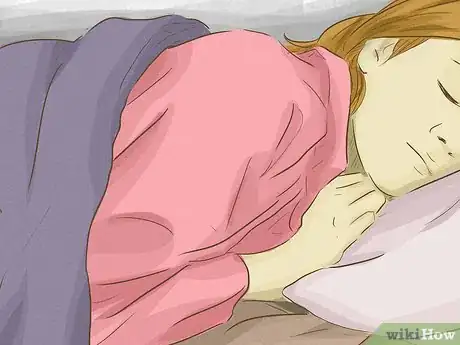

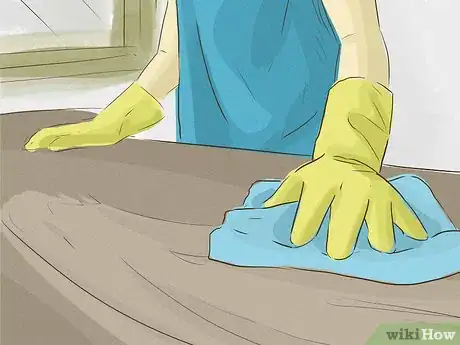
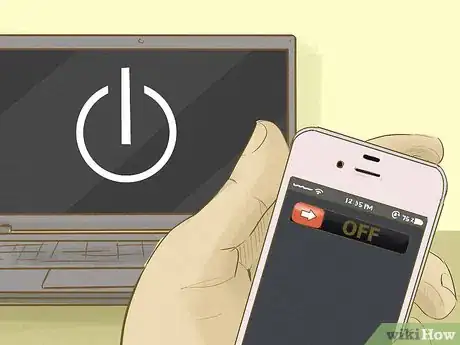
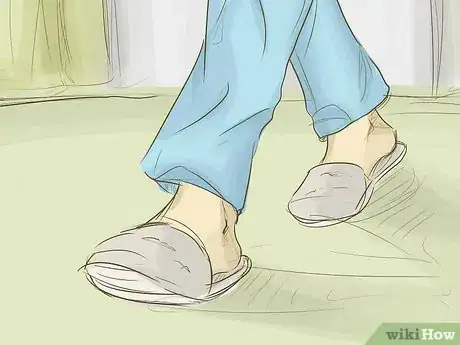

-Step-10.webp)
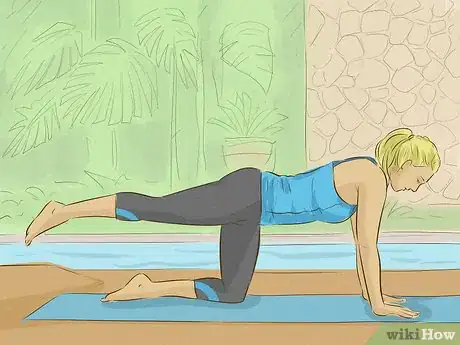

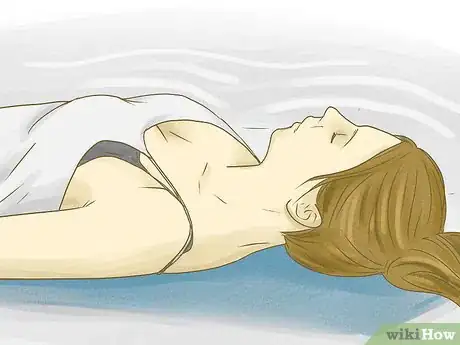
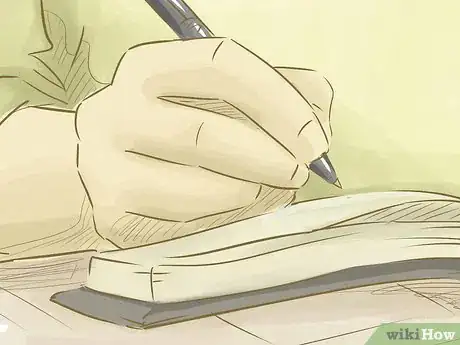

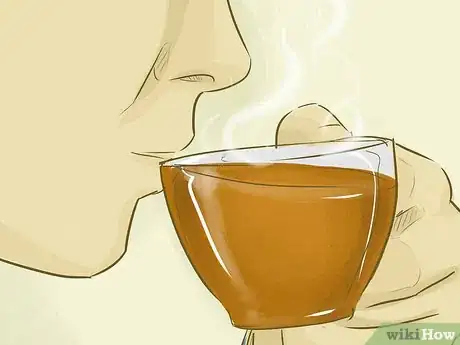

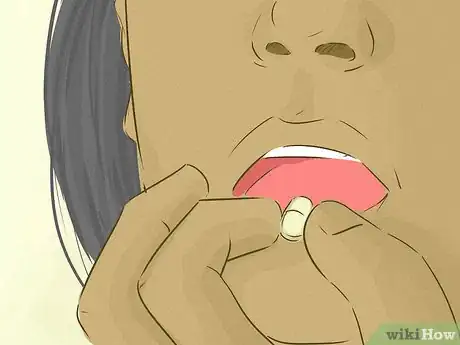



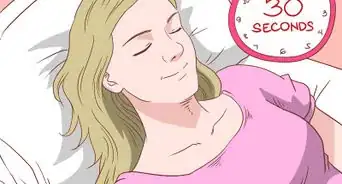




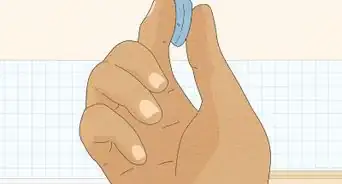
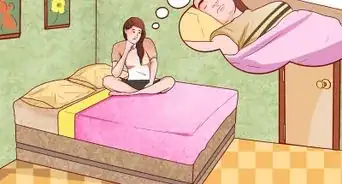




















































Medical Disclaimer
The content of this article is not intended to be a substitute for professional medical advice, examination, diagnosis, or treatment. You should always contact your doctor or other qualified healthcare professional before starting, changing, or stopping any kind of health treatment.
Read More...